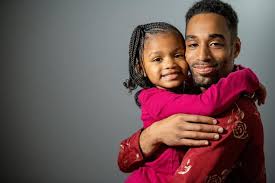
Father’s UpLift was founded in 2011 by husband and wife team Charles Daniels, Jr. and Samantha Fils-Daniels. After their own lived experiences in both their personal lives and their professional lives in the field of social work, Charles and Samantha were well-aware that there was an incredible lack of resources, guidance, and mental health focus for fathers and men, especially in minority communities. As a product of fatherlessness himself, Charles frequently wondered, “If my father had had the right resources and support, would things have been different?”. Samantha, whose father had been involved in her childhood, was able to bring a perspective to the table of what healthy fatherhood could look like and accomplish for children, families, and the fathers themselves.
Between their shared experiences, Charles and Samantha set out to create an organization that would support fathers like Charles’ and help them to overcome obstacles, emotional, physical, and mental, which might keep them from full involvement in their children’s live. Their signature Father’s Homecoming program provides wrap-around mental health and support services for low-income men experiencing reentry. They first make connections with fathers 6 months prior to their release so that they are ready to provide resources and a supportive community on day one of their release. Fathe’s UpLift’s results have been impressive, with an average recidivism rate of 4% for men participating in the program after one year, which is nearly 90% lower than the state average.
Partnering with The Lynch Foundation
The Lynch Foundation was incredibly impressed by the positive impact Father’s UpLift was having on its participants, their families and communities. In 2022, The Lynch Foundation provided Father’s UpLift a multiyear grant to scale their Father’s Homecoming program and open a drop-in facility in the heart of Dorchester to provide more in person services. Once fully scaled the program will serve 150 men annually, which at a 4% recidivism rate will save the Commonwealth $2.6M annually in incarceration costs alone, which is on top of the direct benefits provided to the families involved.